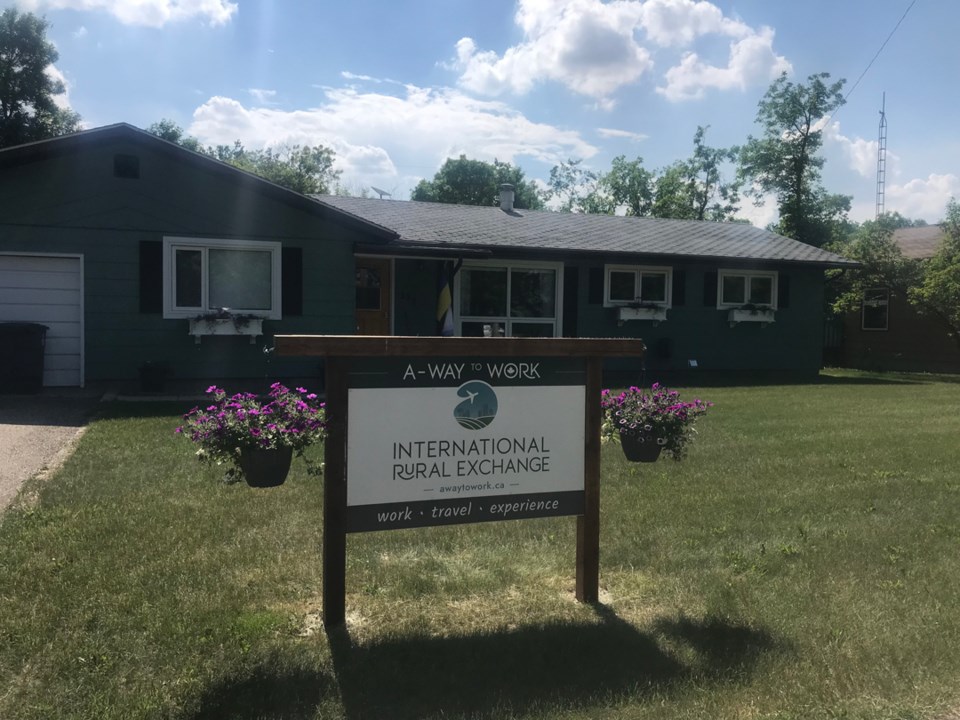ALAMEDA - The heart of the International Rural Exchange (IRE) has always been agriculture and facilitating relationships.
Farmers started it as a solution to find workers for their fields in 1985, and it has turned into an act of fostering international relations.
Executive director Anita Warriner started with the IRE as a host, welcoming young adults from all over the world to her and her husband’s farm. It wasn’t until 2009 that she took over in the running of the IRE, moving it to its current location in Alameda.
“It’s all about connection with the host and bringing people into Canadian culture, bringing them to community events. If people use them as cheap labour it doesn’t work,” Warriner shared. “This develops good and close relationships, if the host can be patient with the English and training, it’s incredibly enriching.”
At the IRE there are two halves of the same coin, inbound and outbound. For inbound, over 200 young adults between the ages of 18 and 35 come into Canada on a work permit and are hosted on a farm.
Warriner and her eight staff members get to know the trainees that come from a growing number of countries from Central America, Asia, Australia and most of Europe. South Korea and Finland have recently been added to the growing list. Then they pair them with the optimal host here in Canada.
“We are meeting the needs of the Canadian agriculture community that is limited by labour, with skilled farmers,” said Warriner. “Farming is a trade in Europe with people having gone to school or growing up on a farm.”
“The trainees from abroad want to work on big machinery and big farms because their farms could be as small as a lawn, maybe 40 acres.”
If you are Canadian, Kori Kress can help you go on an outbound placement.
“We are looking for anyone that grew up on a farm or went to school for agriculture who wants to experience a different culture,” Kress said.
It is also a good option to look into if you need to do an agriculture internship for school.
If you find yourself a little too old to meet the age requirements to go, you can still experience it all by becoming one of the 130 current host families. IRE has host farms from B.C. to P.E.I. but most are located in the Prairies.
“Lots of hosts use to be trainees or their parents were. It showcases Canadian agriculture and lets people know about its excellence and it pays off in the long run when we host well and are good to people,” Warriner said.
She also talked about how there can be ripple effects on a larger scale.
“Once people can experience how we operate, the more it will affect their decision making,” in matters of countries buying our grain and trade, she said.
As one can imagine, maneuvering and organizing the details of over 200 people a year can take a lot of work. IRE also, apart from all the interviews and paperwork, will assist with details like visas and booking flights. Room and board is provided by the host family, and the IRE partners in any given country take over looking after the trainee on arrival as they do for trainees that come here.
Grow Abroad is a network of international partners that are not just voices on the other end of the phone. IRE yearly goes over to meet up with their partners to make sure the process is a safe and supported way to travel. This also ensures that they know exactly where they are sending trainees.
“Those that do agriculture exchange are a niche market; there are not many recognized organizations like us,” Warriner said. “Our biggest partner is in Switzerland and we are in daily communications with them. We start planning in Nov/Dec for people that are coming for the April start. Then we do more placing in March/April for harvest time.”
Trainees usually stay for seven months or three months if they are just coming for the harvesting, though they can usually come for up to a year.
By being a host for 20 years, Warriner’s life has changed from hosting a wedding for trainees to making lifelong friends. Last year her and her husband retired from farming and asked their old trainees if they wanted to work alongside them again for one last hurrah.
“We had 15 people come back and live on our farm,” she said with a smile.


